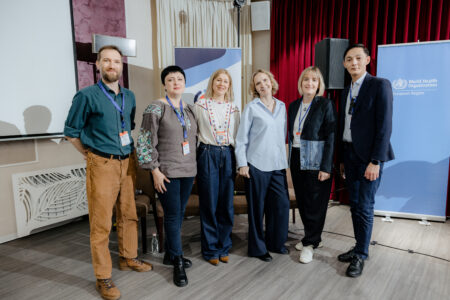On November 25-26, 2024, the Second Regional Consultation on HIV Pre-Exposure Prophylaxis (PrEP) took place in Almaty, Kazakhstan. The session “Innovations in PrEP Service Delivery” was moderated by Nadia Yanhol, PrEP Program Coordinator for the #SoS 2.0 Regional Project of the Alliance for Public Health.
“Last week, AVAC presented the latest global official data on PrEP — 7.5 million people are taking PrEP. We need to remember this number and compare it with next year’s data, as the main innovations in PrEP service delivery have taken place or will occur in 2024-2025. Speaking about the CEECA region today, we see how the ‘market’ for PrEP services is changing — injectable PrEP, pharmacy-based PrEP, and community-based PrEP. We also see excellent collaboration among all stakeholders involved in this process, which has been key to achieving these results,” noted Nadia Yanhol.
Key presentations of the session included:
Expanding Access to PrEP Through Pharmacies and NGO Services (Aidar Kapasov):
– Kazakhstan is a leader in implementing innovative PrEP approaches in Central Asia.
– In 2023, PrEP became available through six friendly NGOs and began being offered through pharmacies in Almaty, expanding to Astana in 2024.
– Advantages of This Approach: accessibility for migrants, convenience, reduced stigma, increased awareness, and lower healthcare costs.
Introducing Long-Acting Injectable PrEP with Cabotegravir in Ukraine (Olga Klimova):
– Ukraine became the first country in the CEECA region to offer long-acting injectable PrEP.
– Initial program results in Kyiv and Lviv: over 100 clients enrolled within three months.
– Plans for 2025: implementation monitoring, program expansion to additional at-risk groups and regions.
The Role of Community Organizations in Expanding PrEP Access (Olga Samoylova):
– Community organizations actively create demand for PrEP through various communication campaigns.
– Implementation models include social media testing, index testing, and telemedicine.
– Examples: Kazakhstan (352 clients through NGOs), Tajikistan (247 clients through community health centers), Kyrgyzstan (133 clients).
Optimizing PrEP Access in Central Asia (Anna Deryabina):
– Engaging private doctors, extending working hours, and collaborating with NGOs contributed to the successful growth of PrEP demand.
– Key Success Factors: government support, cross-sectoral collaboration, and ongoing staff training.
Communications for Attracting PrEP Clients (Denis Gryazev):
– Successful communication strategies are based on audience analysis, selecting the right communication channels, developing scripts, and maintaining constant feedback.
– Principles of effective communication help establish a reliable connection between services and clients.
This consultation strengthened regional cooperation, opening new opportunities for implementing and monitoring PrEP programs.
The event was organized by ECOM with the support of the Alliance for Public Health, the World Health Organization (WHO), UNAIDS, the Centers for Disease Control and Prevention (CDC), FHI 360, USAID, and numerous local non-governmental organizations.












